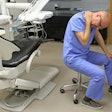In the past year, more than 3% of healthcare workers, including dentists, in the U.S. reported attempting suicide, and a combined 20% reported thinking about or planning to end their lives. The study was published on August 1 in the Journal of Psychiatric Research.
Increased compassion fatigue, a state of physical and emotional exhaustion that prevents a person from empathizing with others, was significantly linked to greater odds of thinking, planning, or attempting suicide in the past year, the authors wrote.
“Findings suggest that higher compassion fatigue is linked to increased suicidality among healthcare workers, highlighting the need to address compassion fatigue as a potential risk factor,” wrote the authors, led by Rachel Hoopsick, PhD, of the department of health and kinesiology at the University of Illinois Urbana-Champaign.
Healthcare workers who don’t have positive psychological well-being are not only risking their health but the care of their patients. Therefore, it’s imperative that the healthcare workforce’s mental health needs are evaluated, according to the study.
Although compassion fatigue, which may include depersonalization and career dissatisfaction, and suicide risk among healthcare workers have been investigated separately, the possible correlation between the two has rarely been studied until now.
To explore the relationship, cross-sectional data from 200 U.S. healthcare workers, including dentists, nurses, doctors, social workers, and psychologists, were analyzed. Then logistic regression models examined relationships between compassion fatigue and suicidal thoughts, planning, and attempts, the authors wrote.
Among the participants, the risk of suicide was prevalent. In the past year, 14% of healthcare workers reported suicidal thoughts, 6% reported planning suicide, and 3.5% reported attempting suicide, they wrote.
Furthermore, heightened compassion fatigue was significantly correlated with increased odds of past-year suicidal thoughts (odds ratio [OR] = 1.10; 95% confidence interval [CI], 1.04 to 1.16), suicide planning (OR = 1.10; 95 % CI, 1.02 to 1.19), and suicide attempts (OR = 1.10; 95 % CI: 1.01 to 1.21).
Nevertheless, the study had shortcomings. The researchers were limited in identifying which roles may be at an increased risk for compassion fatigue-associated suicidality due to the sample size. This limitation shines a light on a gap in understanding which positions may experience stress that could make them more vulnerable to suicide, the authors wrote.
Future studies should explore compassion fatigue within specific specialties to identify those most vulnerable to suicide, they wrote.
“In conclusion, there is an urgent need to screen for and address the early onset of compassion fatigue among healthcare professionals,” Hoopsick and colleagues wrote.




















